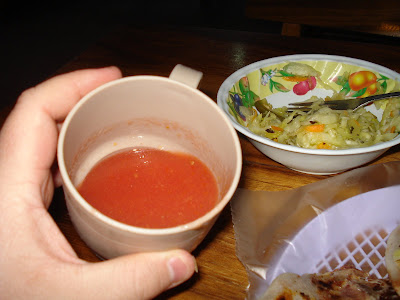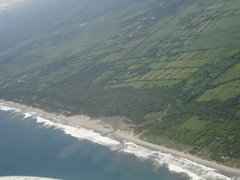 As we milled about within the well-fortified walls of Hotel Pacific Paradise, I started to get a little antsy. What exactly were all those armed guards and curly razor-wires protecting us from? What kind of mortal danger awaited us on the outside?
As we milled about within the well-fortified walls of Hotel Pacific Paradise, I started to get a little antsy. What exactly were all those armed guards and curly razor-wires protecting us from? What kind of mortal danger awaited us on the outside?The curiosity was killing me. I couldn't stand it any longer.
I turned to my beautiful wife, and sweetly suggested that we sneak out. This is exactly the kind of bone-headed decision my mother was worried about.
The whole idea of making a break for it started with a conversation over dinner. Our kind hotel waiter, Santos, mercifully granted my request for a side order of tortillas -- the very thick, greasy, corn-based version that is common all across El Salvador, but hard to find in Texas.
Pointing to the awful, gummy American-style dinner rolls they trotted out with our meal, I asked Santos, "Would you eat that?"
"No," he smiled, then pointed over to the tortillas. "Comemos las tortillas." We eat the tortiallas.
I decided right then and there -- it was time to sneak out. We needed to escape from this "paradise." We wanted the real El Salvador, to eat what real people on the streets were eating.
We were ready for pupusas.
Pupusas are to El Salvador what the tamale is to Mexico, what rice is to Korea, what barbeque and breakfast tacos are to south Austin. They are the staple food of this country. They're thick, hand-made corn tortillas usually stuffed with white cheese, or sometimes even pork, beans or chicken.
 My mouth watered just thinking about it. It was time to make our move.
My mouth watered just thinking about it. It was time to make our move.In the dark of night, we snuck out of the hotel compound (OK, OK, really, we didn't have to "sneak"), past the armed guard stationed at the gate, and walked directly across the street to a place called Pupuseria Yessica.
A stern-looking middle-aged woman stood behind the griddle, eyeing us suspiciously. She spoke no English, and seemed to be in no mood to deal with ignorant gringos.
"Yessica?" we asked.
"No," she finally cracked somewhat of a smile. "Me llama Marie Elena."
 Yessica, it turned out, was the name of her young daughter playing nearby, perhaps the girl who would someday take over this pupuseria.
Yessica, it turned out, was the name of her young daughter playing nearby, perhaps the girl who would someday take over this pupuseria.We weren't sure exactly what to order, but somehow it all worked out. It wasn't long before Marie Elena started churning out the pupusas right before our eyes.
She made each one by hand, carrying out every step of the recipe in a methodic rhythm. First, she'd grab a small handful of sticky prepared masa, throwing the ball against the palm of each hand a few times. Dipping her fingers in a nearby bowl of water to keep them from sticking to the dough, she then formed a ridge in the middle of the masa ball and stuffed some cheese into it. She then carefully folded the edges of the circle over toward the center to cover the cheese before finally flattening out the concoction and frying it on both sides.
The pupusas came off the grill, hot, greasy, filled with steaming melted white cheese. Just a humdrum culinary staple of El Salvador, and yet my eyes are popping out of my head with anticipation.
Michele and I happily gorged. And there stood Marie Elena, watching proudly as her American guests moaned and grunted their approval. As far as Marie Elena was concerned, the ice was now broken. We were in. The language barrier was shattered, and we suddenly became very welcome visitors.
I also became officially hooked. Where have these pupusas been all my life?
We snuck out again the next night, determined to score yet again on my newfound jones for pupusas. I was horrified to find Marie Elena had taken the night off. We walked about a quarter of a mile down the road, and were happy to find Pupuseria Rosy.
 Rosy is the head cook and namesake of this modest roadside eatery, and it's not just Rosy's business. It's also home for her, her husband, and her three kids (really cute kids, all pictured below).
Rosy is the head cook and namesake of this modest roadside eatery, and it's not just Rosy's business. It's also home for her, her husband, and her three kids (really cute kids, all pictured below).As Rosy cooked, her husband decided to try out his English on us. He'd been taking lessons over the past two months, and was happy to practice on someone. For a guy with only two months' worth of lessons, he was pretty good.
Then it was time to eat. And Rosy's pupusas were fantastic.


Pupusas are traditionally served with curtido - a pickled cabbage relish containing hot peppers - and a warm, spicy tomato sauce.



We noticed Rosy's husband had disappeared. "Donde es su esposo?" I asked.
Rosy said he works at a marina just down the road, and when bad weather moves in, he has to get over there to make sure everything's okay.
And then, just when it seemed it couldn't rain any harder, it did. Michele started getting nervous.


 By the time the thunder, lightening and blowing rain had subsided, we had gone through eight pupusas, two orange sodas and two beers. Rosy's total bill for us came to just under $5.
By the time the thunder, lightening and blowing rain had subsided, we had gone through eight pupusas, two orange sodas and two beers. Rosy's total bill for us came to just under $5.We thanked Rosy and said adios to her three wonderful, precocious kids.
The quarter-mile walk back to our hotel was in total darkness. Michele held my arm tight, and told me she was a little scared. Our eyes squinted far down the road toward the only visible light - that of the brightly-lit hotel sign at the front gate.
As we walked down the wet road, we noticed the sounds of several upbeat voices echoing through the streets, each one coming from the open doors and windows of pitch-dark buildings that appeared to have no electricity.
It was another reminder of the poverty-stricken world that waited outside the fortified walls of Hotel Pacific Paradise. And we knew we hadn't seen anything yet.





No comments:
Post a Comment